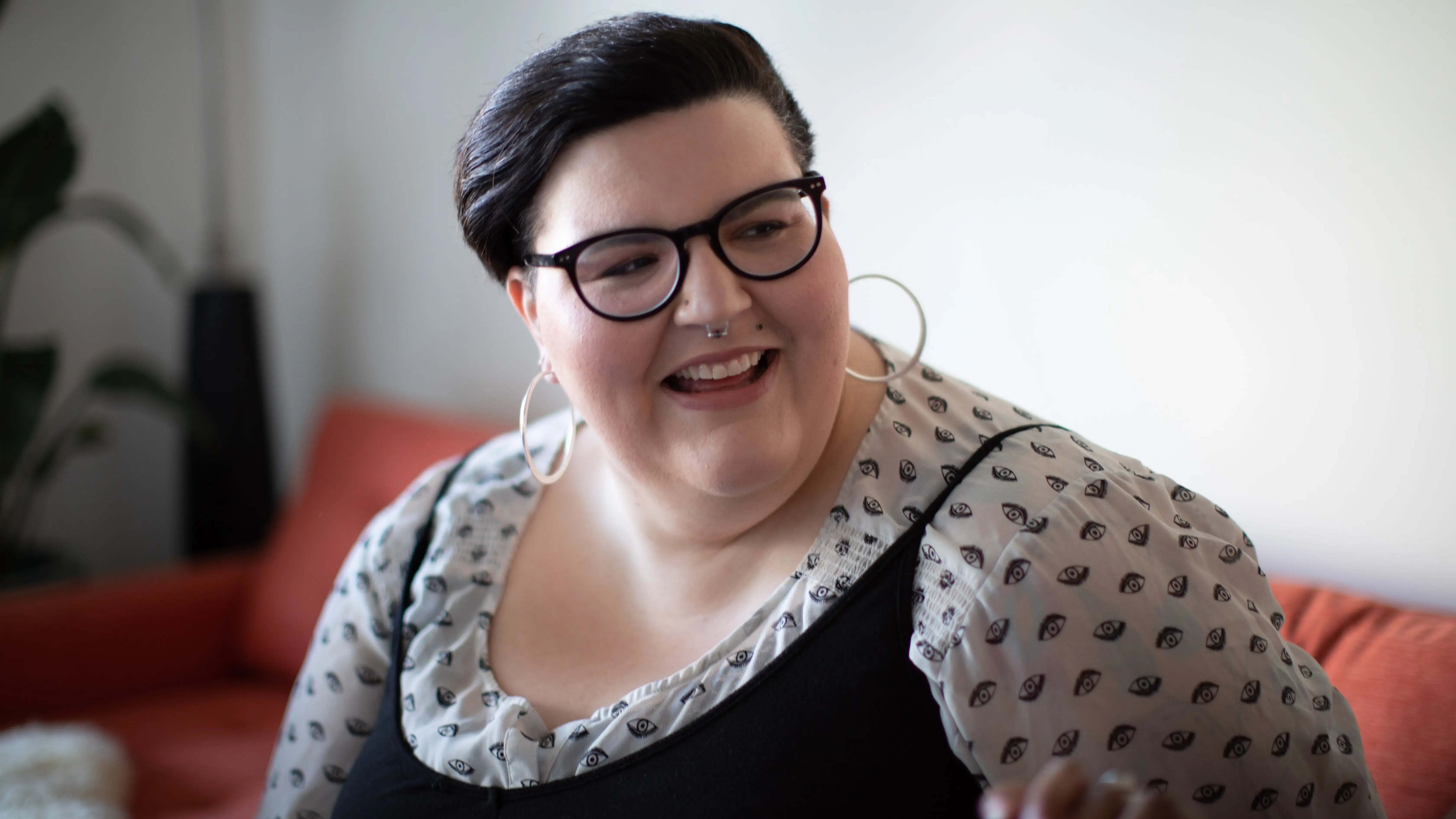Wise Heart Nutrition Blog:
All Things Anti-Diet, Intuitive Eating, and ADHD
The Truth About ADHD and Sugar: Are We Addicted?

The results are in…
*SUGAR IS NOT ADDICTIVE*
Good news, fellow ADHDers! We are NOT addicted to sugar because sugar is NOT an addictive substance. Thanks for tuning in—see you next time!
...
But seriously, sugar addiction is a hot topic (and we have a lot to say about it). Whether you’ve felt an uncontrollable pull toward sweets (maybe due to diet culture, undernourishment, using sugar as a coping tool, the list goes on) or heard friends, family, or partners share their own “sugar struggles,” I’m here to offer a fresh perspective on this tasty debate.
Let’s start with the basics… What the heck is sugar?
SUGAR / STARCHES / CARBOHYDRATES = GLUCOSE
In our bodies, all sugars—from fruits, grains, roots, legumes, veggies, sweets, and drinks—are eventually broken down into their simplest form: glucose. Glucose is a neat little ring-shaped molecule that gets absorbed from our bloodstream by our cells to create energy. In fact, about 45-65% of our energy comes from glucose alone. Wowee! T...
Feeling Restless? Add Some New Tools to your Toolbox!

Transitions, changes, the unknown. Boredom, monotony, lack of stimulation. Both sides of the spectrum, both faces of the coin, can bring a sense of restlessness within us. It can feel unsettling in the body and for many of us, it’s hard to sit and be with that buzzy feeling of unease.
Our natural human instinct is to sound the brain sirens, react to that restlessness, impulsively grab the quickest and trustiest toolbox tool we’ve got, and hope the discomfort can be pacified, just for a moment, please!
So what does that trusty tool look like for most of us? Like a mother that gives a bottle to a crying baby, our lifetime body wisdom tells us food will comfort, console, and bring relief to us during those pesky periods.
And yes! Lived experience has shown us time and time again that the action of eating does soothe the ever-so-ancy soul. It is a tried and true tool in the emotional toolbox and because it’s also linked to the nourishment of this living and breathing body, i...
5 Steps to Help You Get Started on Your Intuitive Eating Journey

So you’re here because intuitive eating sounds intriguing, but you just have no idea where to start. It’s ok - we’ve been there too! We’ve rounded up 5 actionable steps to start intuitive eating. Try 1-2 a week and call it your jump start month, or take allll the time you need. If you think about it, reading this article is already kinda the first step - so you’re killing it already!
Recognize that diet culture is harmful and weight loss is not equivalent to health
You may still be on the fence about this whole ~intuitive eating~ thing - that’s okay! The best way to get clear about what you want is to learn the facts. Unfortunately, folks are told over and over by medical professionals (including dietitians) that losing weight is necessary, when there actually isn't robust or causal research behind those recommendations. What we do know is that 95% of people who lose weight intentionally, end up gaining all or more back within 2-5 years. People end up fixating on weight and tr...
What are the Benefits of Intuitive Eating? Are there Drawbacks?

Intuitive eating has been a buzzword for quite some time now, and it's likely that you've come across various opinions and perspectives on the topic. With countless articles, blog posts, social media discussions, and even dubious spin-offs claiming the name of intuitive eating, it can be challenging to navigate the sea of information and determine the truth about its benefits and drawbacks. In this post, we'll break down the advantages and disadvantages of intuitive eating, highlighting that these factors vary depending on the individual. So, whether you're new to the concept or a seasoned pro, keep reading to learn more about this popular approach to eating.
Let's start with the good stuff and dive into the benefits of intuitive eating!
The Benefits
- A more balanced relationship with food
- Research has shown that practicing intuitive eating can lead to a more balanced relationship with food, decreased stress and anxiety around eating, and an overall more balanced plate a...
What is Body Trust? And 3 Steps to Start Building It!

The term “body trust” is showing up more and more on social media, in resources, and on the internet, but more often than not, we hear that folx are still unclear as to what body trust even means. We want to help explain not only what it is, but share 3 steps to start building body trust today, tomorrow, or whenever you are ready!
Body Trust is More than a Buzzword
Body Trust® is a trauma informed model / healing approach developed by Hilary Kinavey, MS, LPC and Dana Sturtevant, MS, RD (founders of The Center for Body Trust®). They define Body Trust® as “A radically different way to occupy and care for your body. It is a pathway to reclaim your body. Body Trust is paradigm shifting work that invites bravery and fierce body compassion.”
In action, body trust is a practice in which you counter conventional “wisdom” about food, body image, weight, and health in our culture, and instead look within your body for its own wisdom on what feels most aligned for you. It is a framework ba...
What About Fat Shaming People Who Aren’t Fat?

*The word fat in this article is used as a neutral descriptor of bodies, but acknowledges the intent behind fat shaming to be hurtful and discriminatory.*
Ahh, remember those fond and formative years of the early 2000s … record scratch. Remember being bombarded with media from all directions with content devoted to fat shaming? Remember waiting in the check-out line at the grocery store and seeing the magazines plastered with insults and calling out how much weight a celebrity had lost or gained? Looking back, though, a lot of those people that were constantly being publicly bullied for their weight … weren’t actually fat. We’ve established that body shaming is completely horrible, but what about fat shaming people who aren’t fat?
While it doesn’t compare to the harmful magnitude of fat shaming real fat bodies, body shaming those in smaller bodies is its own special brand of gaslighting that’s used as a method of societal control. It’s an insidious form of misogyny, and a seem...
Intuitive Eating with Diabetes, PCOS, and other Chronic Conditions

So you’ve heard about intuitive eating, but you don’t know if it’s for you because you live with a chronic health condition. There are 10 principles of intuitive eating, focusing on rejecting diet culture, finding your hunger and fullness cues, discovering satisfaction in food and movement, and gentle nutrition. While a chronic condition may pose a barrier to one or more of the principles, it is possible to start by focusing on the components that are within your ability. Read on to find out how you CAN eat intuitively with diabetes, PCOS, or any other chronic condition!
What About My Weight?
Many chronic health conditions carry the stigma that they are caused or worsened by weight, but clinical research has still failed to definitively show this to be true. Weight or BMI is not indicative of health. Those in the “overweight” or “o—-” BMI category lead just as long and healthy lives as those in the “normal” BMI category, if not longer. And of individuals with a chronic illness, t...
What Is Normal Eating? Take the Quiz!

You may have made your way to this page because you feel confused about what “normal” eating even means. You have probably endured years, or decades, of messages like “you should eat this, not that”, “that is a bad food”, and “you can have as much of this guilt-free (read: diet) food as you want”. If you have been trying desperately to lose weight by following various diets, sticking to food rules, or eating according to any kind of external plan, your hunger and fullness cues might be totally out of whack. And on top of all of this, trying to wade through the ocean of nutrition and “health” information available on the internet and social media is completely overwhelming to sort through. Whew! No wonder you’re feeling confused!
Well, you landed in the right place! We have created a normal eating quiz (guide, checklist, assessment - or whatever you want to call it) to provide you with a jumping off point for bringing more aspects of normal eating into your relationship with food...
Why Does Eating For Pleasure Matter So Much?

Whether you're a newcomer to intuitive eating or a seasoned vet, pleasure in food can sometimes still feel like a dirty word. Allowing and enjoying pleasure in your eating experience goes against everything diet culture stands for, like self-control, denial of pleasure, and avoidance of "bad" foods.
The intuitive eating principles describe pleasure in food as one of the most basic and important factors in feeling satisfied or content with food. So eating for pleasure is important, and in this blog, we'll answer 4 questions about food/eating and PLEASURE.
What are some of the psychological health benefits associated with food enjoyment?
- Pleasure of any kind (including pleasure from food) leads to a release of dopamine (a neurotransmitter) in the brain. Dopamine is often referred to as the “feel good chemical” because it activates the reward pathways in the brain, which helps to promote happiness, calmness, motivation, and focus.
- Thanks to diet culture, a big part of dis...
5 Tips to Improve Self-Esteem

Self-esteem can be a major area of confusion and heartache for many (ok, probably most). In order for our clients at Wise Heart Nutrition to truly experience progress in healing their relationship with food, we typically have to spend some time addressing self-esteem. First of all let’s clarify what self-esteem really is and why it’s important to our everyday lives. Then we’ll get to the good stuff - 5 steps to improve your self-esteem.
What exactly is self-esteem?
Self-esteem is your subjective sense of overall personal worth or value. The key word here is subjective - self-esteem may not be based on reality, but rather our perception. Similar to self-respect, it describes your level of confidence in your abilities and personal attributes.
Some sources that contribute to low self-esteem include:
- Living through negative or traumatic experiences
- Lacking access to positive support systems
- Engaging in or taking actions that don’t line up with our values
- Societal norms ...
